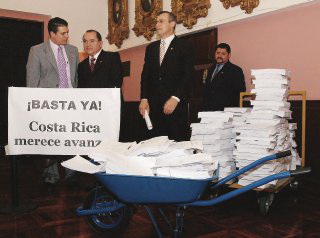Journal Articles
“Populism Trumps Ideology: Poverty Relief Policy under Mexico’s López Obrador and Brazil’s Bolsonaro.” (2025). Journal of Latin American Studies 57 (1): 135-160.
“It’s Not Me, It’s You: Social Affinity, Anti-Solidarity and Support for Redistribution in Latin America.” (2022). Latin American Politics and Society 64 (3): 1-36.
“Debating Trade: The Legislative Politics of Free Trade Agreements in Latin America.” (2019). Government and Opposition 54 (2): 336-364.
“Neoliberalism with a Human Face?: Ideology and the Diffusion of Latin America’s Conditional Cash Transfer Programs.” (2018). Comparative Politics 50 (2): 147-169.
“Costa Rica 2016: Third Time’s a Charm? Not for Luis Guillermo Solís’s Tax Reforms.” (2017). Revista de Ciencia Política 37 (2): 389-412.
“Rules of Procedure as a Cause of Legislative Paralysis: The Case of Costa Rica, 2002–2012.” (2014). Latin American Politics and Society 56 (4): 119-141.
“Best Practices in Scholar-Practitioner Relations: Insights from the Field of Inter-American Affairs,” (with Mariano Bertucci and Claudia Fuentes-Julio). (2014). International Studies Perspectives 51 (1): 54–72.
Literature Reviews
“Social Policy in Latin America: Two-tiered Welfare Regimes at a Crossroads.” (Forthcoming) Elgar Encyclopedia of Latin American Politics.
“Adoption and Evolution of Cash Transfer Programs in Latin America.” (2019). Oxford Research Encyclopedia of Latin American Politics.
Policy Briefs
“Child Poverty and Cash Transfers: Public Opinion Endorses an Available Solution,” (with Merike Blofield and Juliana Martínez Franzoni). (2024). Policy in Focus 1, 1: 56-58. World Food Programme/International Policy Centre for Inclusive Development/Institute for Applied Economic Research.
“Public Opinion on Cash Transfers for Children and Adolescents in Mexico: Clear Support for Greater Coverage and Adequacy,” (with Merike Blofield and Juliana Martínez Franzoni). (2023). Policy Brief, Social Research Institute, Universidad de Costa Rica.
“Bolivia’s Social Policy Response to Covid-19: Hindered by Political and Economic Crises.” (2021). Covid-19 Social Policy Response Series 15/2021, Universität Bremen: CRC 1342.

Filibustering: Opponents of CAFTA-DR issued 5,000 amendments spanning 52,000 pages to the first three of the 13 reforms Costa Rica needed to implement to be allowed into the agreement.
